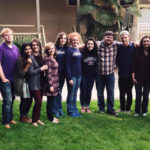ARLINGTON—Scholars David Peterson and Bruce Leafblad challenged students at the B.H. Carroll Theological Institute’s 2008 summer colloquy to rethink the purpose and practice of worship.
Peterson of Moore Theological College in Sydney, Australia, urged church leaders to plan worship grounded in Scripture and rooted in tradition.
He warned against the “rush to be culturally relevant and to keep up with the charismatics and the Pentecostals” and advised using more Scripture and statements of purpose in church services.
“I’m a strong advocate of modern songs, but so often people get their theology from songs. How much theology is taught in our music?” Peterson said.
The distinctions among man-to-man, man-to-God, and God-to-man relationships in worship are artificial, Peterson continued, because in worship, all happen simultaneously.
Horizontal relationship
The “horizontal relationship” of a person giving his or her testimony to another person does not exclude God’s involvement in that exchange, Peterson explained.
Distinctions between worship and “the rest of the service” indicate many churchgoers’ categorizing mentality that denies the power of each part of worship, he said.
“If we expect to encounter God and be ministered to by his word and his Spirit in corporate worship, we need to say so regularly, and pray to that end,” Peterson said.
Sign up for our weekly edition and get all our headlines in your inbox on Thursdays
Retired Southwestern Baptist Theological Seminary professor Bruce Leafblad took a different tack. Leafblad discussed the meaning and practice of worship through close analysis of Exodus 33:2-18, where Moses meets God in “the little tent of meeting” outside the Israelite camp.
Leafblad used different elements of the scene to derive “universal principles of worship.”
Intimate communion
Through these principles, Leafblad described worship as a meeting of intimate communion with God that expresses a personal relationship in authentic conversation. This relationship is distinguished by the presence of God and an insatiable desire for his glory.
“Religion can be practiced by anyone, but true worship requires a relationship. … We express that relationship in worship, but it is neither logical, nor inevitable, nor acceptable outside of that relationship,” he explained.
Sharing a personal relationship with God is necessary for true worship, Leafblad said. Father-child, husband-wife, and best friendship provide the three most common models of intimacy in Scripture, Leafblad noted.
“Authentic worship will always be expressed in relational terms,” he said. “God’s best gift to us is himself.
“The glory of God is both the proximate goal and ultimate purpose of worship. … The life of worship is appointed to all believers as a privilege and a gift.”














We seek to connect God’s story and God’s people around the world. To learn more about God’s story, click here.
Send comments and feedback to Eric Black, our editor. For comments to be published, please specify “letter to the editor.” Maximum length for publication is 300 words.